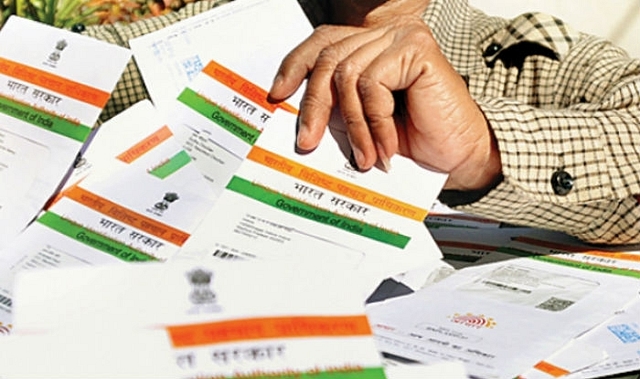
And When Will We Need An Aadhaar To Use A Public Toilet? Unique ID’s Use And Abuse
There is a thin line separating the intelligent use of Aadhaar from unintelligent ones.
This government seems to be about to cross this line. It will come to grief if this overuse forces the courts to clamp down on Aadhaar where its use becomes limited.
It is obvious that the Narendra Modi government wants Aadhaar to be the universal means of identification in India. Nothing wrong in that per se, but Aadhaar’s rapid extension to almost every aspect of life is disconcerting – and a recipe for abuse. There is no better way to build resistance to a good idea than by shoving it down people’s throats using executive fiat.
Make no mistake, Aadhaar is probably one of the best technology-driven innovations in India since Independence, but its overuse can lead to negative consequences, especially when privacy protections are meagre and the government is pushing it too hard in too many places. Its best hope for super success is to make it largely voluntary, but make it so easy to use that it become widely used.
For example, if the idea is to link tax returns to a unique ID, what stops the government from incentivising this by offering, say, a Rs 500 tax rebate for any Aadhaar seeding? Why threaten taxpayers with mayhem if such-and-such a seeding is not done by such-and-such a date?
While one can justify the use of Aadhaar to weed out people with multiple Pan numbers, or even for seeding bank accounts with this number, its mindless extension to mid-day meals for children, for buying crop insurance, for airport staff, for giving benefits to disabled children, or even buying railway tickets through the IRCTC platform is overkill. And we haven’t even listed all the schemes for which Aadhaar is mandated (read here for a peek into the uses it is already being put to). Soon it may become mandatory for obtaining a job, getting married, registering births and deaths, buying property, etc. Aadhaar has become a kind of internal passport and super document that is truly scary. One wonders when we will have to quote Aadhaar to use public toilets.
The funny thing is that the Supreme Court has made Aadhaar non-mandatory for the delivery of public services (where it should be mandatory at some point, once Aadhaar identification failure rates become minuscule), but has no problems allowing the government to use it for many other purposes, including the filing of tax returns, where privacy concerns and the potential for misuse of information are real.
It is not as if this is about inflicting Aadhaar on the poor and sparing the rich. What is really happening is this: Aadhaar is being over-used out of sheer laziness, for it is not as if the information now sought to be collected (to address tax evasion, or misappropriation of subsidies) cannot be obtained otherwise.
Consider how a Google would do it. Google has more information on all of us largely by making its products easy to use. Whether it is search or mail or maps or its storage drive, by making facilities available for free, it collects information that would surprise most users if only they begin to think about it.
By triangulating data points – for example, your computer IP address, with your mobile phone number, and your use of maps, or your search tendencies – Google can hold you to ransom but for the privacy protections it guarantees. Your data is essentially in the hands of a private player, and Google knows your address, your frequent places, your travel dates, and, possibly, the colour of your undergarments, since you may have searched for lingerie on your partner’s birthday. Facebook knows the same details, too. As does Amazon.
Tonnes of data are available with banks, card issuing companies, e-wallets, e-commerce sites, et al. They know how much you earn, what you buy, where you have dinner, and how often you travel by air. That they may not be using the data better for improving their own business potential speaks more about the nascent state of big data analysis in India, but the point is this: what Google can do, the government of India can do even more easily, for it also has the power to impose a rule.
While this government has begun using technology more efficiently than any previous one – the decision to keep taxman-taxpayer interactions to the online mode is one such innovation – it is still not using the data it already has to get what it wants. Hence the lurch towards using Aadhaar for everything. It offers a kind of short-cut to ferret out data by forcing people to conform, and will be counter-productive in the long run. Reason: you now know that Aadhaar is about gathering data about you to figure out if you are evading taxes.
A sensible government will extract the data it needs – whether for smoking out tax evaders or national security risks – by using technology well. Nothing stops the Modi government from hiring a planeload or techies, from India and Silicon Valley, to create software and algorithms to identify issues of interest to it.
It does not require an Aadhaar to get the information it needs. By extending Aadhaar to every possible area, it is making this data available to more and more private parties, where abuse of privacy is likely to be more likely.
It hardly needs reiteration that privacy protection needs to be more robust. But that is another story. The point of this story is that there is a thin line separating the intelligent use of Aadhaar from unintelligent ones. This government seems to be about to cross this line. It will come to grief if this overuse forces the courts to clamp down on Aadhaar where its use becomes limited.